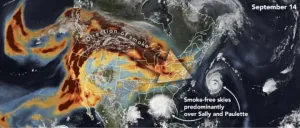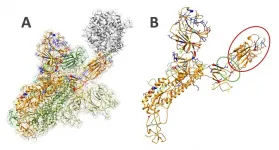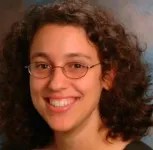What impact did police violence have on participation in the October 1, 2020 referendum?
An academic study by professors Toni Rodon (UPF) and Marc Guinjoan (UB) demonstrates that violence decreased participation at the places where it occurred, but increased participation in surrounding municipalities.
2021-02-02
(Press-News.org) Beaten ballots: political participation dynamics amidst police interventions is the title of the academic article by Toni Rodon and Marc Guinjoan, lecturers of Political Sciences at UPF and the UB, respectively, which seeks to look in greater depth at the effects of police interventions regarding political participation, taking the "repression-mobilization" nexus debate as a starting point.
The study, published recently in the Cambridge University Press journal Political Science Research and Methods, focuses on the analysis of the referendum on independence held in Catalonia on 1 October 2017, when despite the police crackdown, 2,286,217 people voted, representing 44% of the electorate.
The research stresses the study of an aspect that has been largely ignored in the academic literature: the spatial dynamics triggered by violence in political mobilization. That is, whether the police violence on participants has a positive or a negative effect at the places where it occurs and nearby areas.
Toni Rodon, a professor with the UPF Department of Political and Social Sciences and member of the Research and Expertise Centre for Survey Methodology (RECSM-UPF), and Marc Guinjoan, a doctor of Political and Social Sciences from UPF and currently a postdoctoral researcher at the UB Institutions and Political Economy Research Group (IPERG), claim that, in the referendum of 1-O, "although the police raids had a negative impact on local participation, it induced positive spillover effects in nearby areas". According to them, "our findings indicate heterogeneity in spatial dynamics: police actions encouraged people to go to vote in nearby areas, but it also mobilized the residents of these neighbouring areas, especially those with less incentives to go to vote".
The study uses quantitative and qualitative methods with aggregate data relating to polling stations that were visited by the police (with or without violence), a geo-survey conducted by the Centre d'Estudis d'Opinió (CEO - centre conducting surveys on public opinion) a few days after the referendum, and interviews held with members of the police forces. These interviews have enabled the authors to ascertain the micromechanisms of the logic behind the police action, which facilitated their research.
Moving to neighbouring areas and the activation of new voters in protest
The study estimates that although the state police forces managed to reduce the number of votes cast in the municipalities where they took action (around 14-15 percentage points, on average), participation in surrounding areas increased. The greatest effect was felt in municipalities some ten kilometres from the affected spots, where turnout was 6.2% higher than average. About 25 percent of this increase in participation was due to the activation of new voters, while the remaining 75 per cent can be explained by people living in areas raided by the police who travelled to neighbouring areas, which was possible due to the 'universal census' whereby any voter could vote at any polling station.
Among the "new voters", the authors calculate that there was a large proportion of undecided or ambivalent voters, not clearly in favour of Catalan independence but with dual sense of national identity. "Our interpretation of this pattern is that some people who identify equally with Catalonia and Spain, for whom the likelihood of participating in the referendum or travelling to another town to vote was low, became angry and mobilized after seeing police violence in neighbouring municipalities", the researchers assert. According to Toni Rodon, "police violence did not make certain people change from being unionists/federalists to Catalan separatists overnight, but it did mobilize them as a means of protest or civil disobedience".
The police went from following general instructions to acting randomly
Another section of the study focuses on analysing the patterns followed by police action, i.e., why the police went to some areas and not to others: "Before finding out the effects of police actions on participation, we needed to know if their treatment (police violence) was random. Otherwise, it would have been very difficult to identify the effect of violence on participation", Toni Rodon states. And he adds: "As the interviews reveal, the police logically designed an initial plan that was not random (let us recall their actions at the polling stations where the pro-independence leaders voted, for example). However, the day's events ended up making many of their actions random".
The study shows that there is no common policy variable or one that indicates a particular pattern regarding police intervention, either with respect to municipality size or density, turnout for previous elections or support for separatism, profile of the citizens, etc. The agents interviewed acknowledged that the plans changed suddenly the morning of the referendum, once the difficulty had been realized of closing polling stations and confiscating ballot boxes due to the mobilization by the citizens and the activation of the 'universal census'. "The initial goal of preventing a large number of voters from voting suddenly became unviable", the researchers affirm.
Toni Rodon and Marc Guinjoan emphasize that the conclusions they have drawn with this study are very close in line with recent research that has been conducted in other contexts that tends to demonstrate that "police brutality often fails to change what 'partisans think, but this does not mean that they will not react against it when they find it excessive".
INFORMATION:
Reference article: Rodon, T., Guinjoan, M. (January 2021). "Beaten ballots: political participation dynamics amidst police interventions". Political Science Research and Methods
ELSE PRESS RELEASES FROM THIS DATE:
2021-02-02
Experts predict that autonomous vehicles (AVs) will eventually make our roads safer since the majority of accidents are caused by human error. However, it may be some time before people are ready to put their trust in a self-driving car.
A new study in the journal Risk Analysis found that people are more likely to blame a vehicle's automation system and its manufacturer than its human driver when a crash occurs.
Semi-autonomous vehicles (semi-AVs), which allow humans to supervise the driving and take control of the vehicle, are already on the ...
2021-02-02
Recent global calamities - the pandemic, wildfires, floods - are spurring interdisciplinary scientists to nudge aside the fashionable First Law of Geography that dictates "everything is related to everything else, but near things are more related than distant things."
Geography, and by association, ecology, has largely followed what's known as Tobler's Law, which took hold in the early 1970s. But then came the novel coronavirus apparently has leapt from wildlife meat markets in China to the world in a matter of months. Global climate change creates conditions ripe for infernos in the North American west and Australia. ...
2021-02-02
EL PASO, Texas - An effort led by Lin Li, Ph.D., assistant professor of physics at The University of Texas at El Paso, in collaboration with students and faculty from Howard University, has identified key variants that help explain the differences between the viruses that cause COVID-19 and Severe Acute Respiratory Syndrome (SARS).
A team comprised of researchers from UTEP and the historically Black research university in Washington, D.C., discovered valuable data in comparing the fundamental mechanisms of Severe Acute Respiratory Syndrome Coronavirus (SARS-CoV) and SARS-CoV-2 -- also known as COVID-19 -- to better understand how ...
2021-02-02
CORVALLIS, Ore. - Extensive sea ice covered the world's oceans during the last ice age, which prevented oxygen from penetrating into the deep ocean waters, complicating the relationship between oxygen and carbon, a new study has found.
"The sea ice is effectively like a closed window for the ocean," said Andreas Schmittner, a climate scientist at Oregon State University and co-author on the paper. "The closed window keeps fresh air out; the sea ice acted as a barrier to keep oxygen from entering the ocean, like stale air in a room full of people. If you open the window, oxygen ...
2021-02-02
Amazon's search algorithm gives preferential treatment to books that promote false claims about vaccines, according to research by UW Information School Ph.D. student Prerna Juneja and Assistant Professor Tanu Mitra.
Meanwhile, books that debunk health misinformation appear lower in Amazon's search results, where they are less likely to be seen, the researchers wrote in a paper that was recently accepted to CHI, the top annual conference on human-computer interaction.
In their paper, Juneja and Mitra noted that Amazon has faced criticism for not regulating health-related products on its platform. They conducted audits to determine how much health misinformation is present in Amazon's recommendations ...
2021-02-02
The lockdowns and reduced societal activity related to the COVID-19 pandemic affected emissions of pollutants in ways that slightly warmed the planet for several months last year, according to new research led by the National Center for Atmospheric Research (NCAR).
The counterintuitive finding highlights the influence of airborne particles, or aerosols, that block incoming sunlight. When emissions of aerosols dropped last spring, more of the Sun's warmth reached the planet, especially in heavily industrialized nations, such as the United States and Russia, that normally pump high amounts of aerosols into the atmosphere.
"There was a big decline in emissions from the most polluting industries, and that had immediate, short-term effects on temperatures," said ...
2021-02-02
Yale researchers are developing a skin cancer treatment that involves injecting nanoparticles into the tumor, killing cancer cells with a two-pronged approach, as a potential alternative to surgery.
The results are published in the Proceedings of the National Academy of Sciences.
"For a lot of patients, treating skin cancer is much more involved than it would be if there was a way to effectively treat them with a simple procedure like an injection," said Dr. Michael Girardi, professor and vice chair of dermatology at Yale School of Medicine and senior author of the study. "That's always been a holy grail in dermatology -- to find a simpler way to treat skin cancers such as basal cell carcinoma and squamous cell carcinoma."
For the treatment, tumors are injected ...
2021-02-02
A new study from scientists of the Max Planck Institute for Evolutionary Biology in Plön, Germany, and the Chinese Academy of Sciences in Beijing shows that the potential genetic burden of mutations arising from retrogenes is significantly greater than originally thought.
Genetic information is stored in DNA and transcribed as mRNA. The mRNA is usually translated into proteins. However, it has long been known that mRNA can also be reverse transcribed to DNA and integrated back into the genome. Such cases are referred to as retrogenes. In an article, a team from the Max Planck Institute for ...
2021-02-02
When different groups of people come into contact, what's the key to motivating advantaged racial groups to join historically disadvantaged racial minority groups to strive for racial equality and social justice? It's a complex conundrum studied for years by social scientists like Linda Tropp, professor of social psychology at the University of Massachusetts Amherst.
Her latest research, published in the International Journal of Intercultural Relations, tested and supported Tropp and colleagues' proposition that having open communication about group differences is a crucial pathway.
While greater contact between racial groups is typically associated with less ...
2021-02-02
New drivers between the ages of 15 and 25 account for nearly half of the more than one million road deaths that occur worldwide each year, according to the World Health Organization. Educational programs often use fear-based messaging and films of crash scenes to reduce risky driving behavior among young people. But does this "scary" approach work?
A new study published in the journal Risk Analysis suggests that fear-based messaging fails to reduce risky driving behavior, while fear-based Virtual Reality (VR) films depicting a violent collision may actually lead young drivers to take more chances behind the wheel.
A team of psychologists led by University of Antwerp researcher Clara Alida Cutello, PhD, conducted a study of 146 students ...
LAST 30 PRESS RELEASES:
[Press-News.org] What impact did police violence have on participation in the October 1, 2020 referendum?
An academic study by professors Toni Rodon (UPF) and Marc Guinjoan (UB) demonstrates that violence decreased participation at the places where it occurred, but increased participation in surrounding municipalities.


